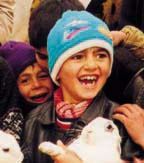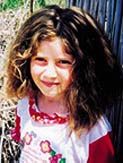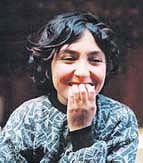|

Spring 2001 (9.1)
Innovations
in Spoken Azeri
Sociolinguistically
Speaking - Part 9
by Jala Garibova
and Betty Blair
Photos of Refugee Children by Vugar Abdusalimov, UNHCR
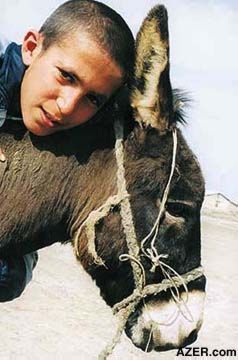  With the collapse of
the Soviet Union in 1991 also came the end of the "information
blockade" - as Azerbaijanis often refer to it. The transition
period that followed has brought many new things, including basic
changes in infrastructure, the explosion of the Internet, exposure
to international media and the ability to travel to study and
tour distant countries. Since Azerbaijanis are being exposed
to so many influences, the Azeri language itself is changing. With the collapse of
the Soviet Union in 1991 also came the end of the "information
blockade" - as Azerbaijanis often refer to it. The transition
period that followed has brought many new things, including basic
changes in infrastructure, the explosion of the Internet, exposure
to international media and the ability to travel to study and
tour distant countries. Since Azerbaijanis are being exposed
to so many influences, the Azeri language itself is changing.
In this installment of "Sociolinguistically Speaking",
we attempt to "capture a moment in time" to describe
some of the most significant changes that we've observed taking
place in spoken Azeri today. Here we comment on some of the innovations
in language usage that we've observed in Baku. Since language
is such a dynamic phenomenon, six months from now, doubtless
there will be even more changes.
_____
Perhaps the most noticeable trends in spoken Azeri these days
can be observed in business offices, especially those where there
is considerable contact with foreigners. Even the etiquette of
something as simple as answering the phone is changing and becoming
more business-like and efficient.
In the past, the person picking up the phone would have likely
answered with a "da" ("yes" in Russian) or
 ("hello"
in Azeri). Today, there is a greater tendency to answer ("hello"
in Azeri). Today, there is a greater tendency to answer  (more polite form of "yes"
in Azeri) and then to add the company's name. More and more foreign
companies are adopting the policy of using Azeri when answering
the phone rather than their own native language (English, French,
German, etc.). This is a relatively new practice and unlike what
was happening when foreign companies first became established
in Azerbaijan in the early and mid-1990s. (more polite form of "yes"
in Azeri) and then to add the company's name. More and more foreign
companies are adopting the policy of using Azeri when answering
the phone rather than their own native language (English, French,
German, etc.). This is a relatively new practice and unlike what
was happening when foreign companies first became established
in Azerbaijan in the early and mid-1990s.
The person who answers the call is also likely to say,  , which roughly translates as
"Good all the time." This phrase substitutes for expressions
like , which roughly translates as
"Good all the time." This phrase substitutes for expressions
like  (Good morning)
or (Good morning)
or  (Good evening),
and is now being used as a generic greeting for incoming callers,
eliminating the need to identify the time of day. (Good evening),
and is now being used as a generic greeting for incoming callers,
eliminating the need to identify the time of day.
Unlike offices in the West, one shouldn't expect the person who
answers to say "How may I help you?", especially right
away. This could come off sounding rushed or pushy to an Azerbaijani,
especially to a caller who is not involved with the international
business community. Instead, after greetings are exchanged, the
person will often say " ,
which doubles for "Please" and "Go ahead"
(in a polite way). The phrase "How may I help you?" ,
which doubles for "Please" and "Go ahead"
(in a polite way). The phrase "How may I help you?"
 may be used eventually,
but it's not typically used as part of the initial greeting. may be used eventually,
but it's not typically used as part of the initial greeting.

Caspian Bank, please / hello. Good all the time.

(Literally, Hello, we disturb you from AzFilm firm.)

Yes, please, how can I help you?
  If the caller asks to
speak to a specific person, he or she might be surprised to have
to identify themselves, as is the usual practice in many Western
offices. This pattern is a newer development in Azerbaijani offices
and is not popular with some callers, especially if they are
from the older generation or hold a higher position than the
person they are trying to reach. If the caller asks to
speak to a specific person, he or she might be surprised to have
to identify themselves, as is the usual practice in many Western
offices. This pattern is a newer development in Azerbaijani offices
and is not popular with some callers, especially if they are
from the older generation or hold a higher position than the
person they are trying to reach.
One Azerbaijani woman who works at an international consultant
firm discovered that some people who call her are surprised and
a bit offended when the receptionist asks for their names. Recently,
one caller joked with her: "Are you the head of the office
nowadays? Is that why they wanted to know who I was?"

Caspian Bank, please/hello. Good all the time.

Hello, May I speak to Farid?

Excuse me, who is asking?
New Words
Since the collapse of the Soviet Union, both Azeri and Russian
have absorbed many neologisms-that is, new words or expressions.
Some foreign words, such as " and
and  (disco), were
already being used during Soviet times. Similarly, the word "super"
was already used in both Russian and Azeri, usually as a prefix
in words like "supermarket" and "superman".
"Super" is pronounced SU-pehr. (disco), were
already being used during Soviet times. Similarly, the word "super"
was already used in both Russian and Azeri, usually as a prefix
in words like "supermarket" and "superman".
"Super" is pronounced SU-pehr.
Newer additions to the language include "gym" and "club".
However, when Azerbaijanis speak of Baku's "Hyatt Club",
the vowel in "club" is pronounced like the vowel in
"clue".
Newer, upscale hotels like the Hyatt or ISR Plaza are referred
to as  , whereas Soviet-era
hotels like the Absheron and Azerbaijan Hotels are still referred
to by the Azeri word - , whereas Soviet-era
hotels like the Absheron and Azerbaijan Hotels are still referred
to by the Azeri word -  (literally,
guest house). (literally,
guest house).
Especially in the political and business spheres, both Azeri
and Russian have incorporated new words such as "visit",
"ex-President", "speaker" and "Parliament".
Sometimes these new words don't represent new concepts, but rather
reflect a new environment, such as a new type of office. Examples
of this include "manager", "file" and "folder".
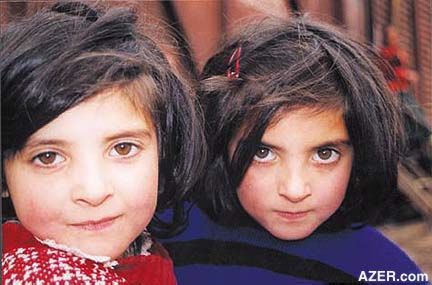
In the business world, the English word "training"
is replacing the Azeri equivalent " or
or  (course), especially
when the training is in a brand new sphere - such as banking
or finance - or is being provided by an international organization. (course), especially
when the training is in a brand new sphere - such as banking
or finance - or is being provided by an international organization.
In Azeri, there is now a distinction between "expert"
and "specialist". An Azerbaijani who has knowledge
and experience in banking, business, finance or another new sphere
is called a "specialist", whereas a similar person
from overseas is more likely to be known as an "expert".
The phrase "busy season" is widely used in foreign
companies and is now appearing in both Azeri and Russian conversations:

A busy season should start in a week.
During Soviet
times, a person who was applying for a job would submit a document
called a  (autobiography).
Today, this document is still used for job openings in local
State enterprises; however, for foreign companies and some local
private enterprises, candidates submit a different type of document
called a "CV" (curriculum vitae). The word "CV"
has been borrowed and is now used extensively in both Azeri and
Russian, much more so than the word "resume": (autobiography).
Today, this document is still used for job openings in local
State enterprises; however, for foreign companies and some local
private enterprises, candidates submit a different type of document
called a "CV" (curriculum vitae). The word "CV"
has been borrowed and is now used extensively in both Azeri and
Russian, much more so than the word "resume":

Send your CV by the 15th of the month.
Sometimes the
word "meeting" ( in Azeri, "sobraniye" in Russian) causes confusion.
Employees of foreign companies often use this word to mean "discussion"
or "session". But many other Azerbaijanis are not aware
of this meaning; they still think of "meeting" in the
sense of a "crowd gathering", as in a demonstration
or protest. This latter meaning was often invoked during the
first few years of the Popular Front movement a decade ago. As
a result, some Azerbaijanis might misunderstand sentences such
as:
in Azeri, "sobraniye" in Russian) causes confusion.
Employees of foreign companies often use this word to mean "discussion"
or "session". But many other Azerbaijanis are not aware
of this meaning; they still think of "meeting" in the
sense of a "crowd gathering", as in a demonstration
or protest. This latter meaning was often invoked during the
first few years of the Popular Front movement a decade ago. As
a result, some Azerbaijanis might misunderstand sentences such
as:

I'm going to a meeting now.

We have a meeting at 2 o'clock.
More English
English words are popping up more and more in short phrases or
replies, such as "OK", "great", "bye"
and "cool".

I'll be waiting for you at 10 o'clock in front of our house.

"Wow"
is beginning to be used by Azerbaijanis as an exclamation of
surprise or amazement:

I finished the translation of the book in a month.
H:
Wow!
"Ouch"
is sometimes overheard around children, especially those who
are learning English or who have been exposed to cartoons and
children's movies in English.
"Oops" sometimes replaces  (Azeri)
or "oy" (Russian) in the speech of both Azeri-speaking
and Russian-speaking young people: (Azeri)
or "oy" (Russian) in the speech of both Azeri-speaking
and Russian-speaking young people:

Oops, I did it wrong.
"The Language"
Since independence, the phrase "the language"  (as opposed to "a language")
has come to refer to the prestige of knowing English. (as opposed to "a language")
has come to refer to the prestige of knowing English.

I want my children to learn the language well.

To work at this job, you should know the language.
In the past,
Russian was "the language". Today, however, Azerbaijani
parents are anxious to have their children learn English. Many
families seek private English teachers, even though lessons may
cost between $5 and $20 each. If a family can't afford this amount,
the parents try to find less-expensive language courses, hoping
that English will jump - start their children's future educational
and job opportunities. Even older Azerbaijanis are eager to learn
"the language", perhaps to find a better job or to
emigrate.
Focus on Azeri
The Azeri language itself is becoming more prominent in Azerbaijan
as well, a change that is even noticeable among very young children.
It used to be that a baby's first words were in Russian: "mama"
(mother) and "papa" (father). Now they tend to be in
Azeri:  (mother) and (mother) and  (father). The words for "grandma" (father). The words for "grandma"
 and "grandpa" and "grandpa"
 have always been
in Azeri. have always been
in Azeri.
As is true of children all over the world, Azerbaijani children,
even those barely able to speak, somehow intuit which language
to speak to which person. They have a knack for knowing how to
code-switch. For instance, they know if their grandmother prefers
to speak Azeri rather than Russian, and will proceed to talk
with her in Azeri though others in the family might prefer Russian.
Azerbaijanis, including those who are basically Russian speakers,
are now more likely to begin and end their conversations in Azeri,
even when leaving a message on an answering machine, technology
that has only recently been introduced to Azerbaijan. Since some
people still have difficulty carrying out the entire conversation
in Azeri (as they have been educated in Russian), they often
use Azeri to say "Hello, how are you?"  and then switch to Russian to carry on the main conversation
and then switch back to Azeri to say "Goodbye"
and then switch to Russian to carry on the main conversation
and then switch back to Azeri to say "Goodbye" 
This tendency even occurs among the members of the popular Azerbaijani
rap group Dayirman (see article about Dayirman in this issue). They sing and "rap"
in Azeri at lightning speed, but they communicate with one another
in Russian because that's the language in which they were educated.
We've observed that Turkish people who are living in Azerbaijan
are making a greater effort to speak Azeri. Immediately after
independence in 1991, when Turks first starting arriving in Baku,
the opposite situation occurred. Azerbaijanis would try to modify
their Azeri to accommodate the Turkish language. Today, the tendency
is reversed. Many people from Turkey try to adapt their intonation,
accent, word choice and even grammar in accordance with Azeri.
Some Turkish people have even begun to use Russian words that
Azerbaijanis commonly use. For instance, many hairdressers in
Baku are from Turkey. When they address their clients, they use
Russian words for terms like haircut (strizhka), hairdo (ukladka)
and bangs (cholka).
Another unofficial "trend" is the tendency of purifying
the Azeri language, which means replacing Persian, Arabic and
sometimes even European words with words of Turkic origin. Such
words are being introduced into the Azeri language mainly through
the media; some have taken considerable time to gain acceptance.
For instance, the word  (before) has replaced
(before) has replaced  , which
comes through Persian. , which
comes through Persian.  (last
name) has replaced (last
name) has replaced  , which
comes through Russian. Other examples include , which
comes through Russian. Other examples include  (cooperation),
which has replaced (cooperation),
which has replaced  , and , and
 (number), which
has replaced (number), which
has replaced  . .
Less Formality
There has also been an effort to get rid of some of the language
patterns from the Soviet period. For instance, before independence,
everything belonging to Russia or the Soviet Union was referred
to as "ours", since almost all property was state-owned.
For example, an Azerbaijani watching a Russian movie would say
in either Azeri or Russian: "This is our movie." It
would be rare for an Azerbaijani to talk this way today.
Formal interactions are starting to be replaced by more personal,
informal ones. A decade ago, Azerbaijani graduate students would
have addressed their professors as "Dr. So-and-so".
It would have been considered rude to call the professors by
their first name. Today, with Azerbaijani students returning
from studying abroad in high school exchange programs, especially
in the United States, it's not so unusual for students to address
professors on a first-name basis.
TV announcers are also less formal and tend to interact with
the audience more, most noticeably by speaking in the first-person
singular - "I", rather than the editorial "we".
In the past, TV announcers tended to say sentences like, "We
would like to acquaint you with the program for tomorrow."
Today, there is a greater tendency to say: "I would like
to acquaint you" Journalists are also encouraged to express
their opinions more openly, since they no longer have to represent
Party policy.
Forms of Address
In English what do you call a person from Azerbaijan? At present,
there are at least three different ways: "Azeri", "Azerbaijani"
and "Azerbaijanian". In most cases, people in Azerbaijan
use "Azeri" to refer to a person and "Azerbaijani"
to refer to the language. Not many young people use "Azerbaijanian",
perhaps because it's so long and more difficult to pronounce.
However, each of the terms can refer to the person or the language.
When speaking to or about a woman, people in Azerbaijan are likely
to say  rather than rather than  , the older form. The word , the older form. The word  has always been used in Azeri
as a form of address to a woman, but it was not as widespread
as it appears to be today. The term is quite flexible and can
be used to refer to a young girl or an older woman, either married
or unmarried. It is usually combined with the woman's first name,
as in has always been used in Azeri
as a form of address to a woman, but it was not as widespread
as it appears to be today. The term is quite flexible and can
be used to refer to a young girl or an older woman, either married
or unmarried. It is usually combined with the woman's first name,
as in 
During the Soviet
period, there was a greater tendency toward using the words  (teacher) or (teacher) or  (citizen). Informal words like "
(citizen). Informal words like " (sister) and
(sister) and  (aunt)
are still used quite frequently today to address a woman. (aunt)
are still used quite frequently today to address a woman.
The word  can also be used
alone when the name is not known. For instance, in addressing
a stranger, just like "ma'am" is in English. can also be used
alone when the name is not known. For instance, in addressing
a stranger, just like "ma'am" is in English.

Excuse me, ma'am, someone is calling you.
With the increased
usage of  , the word is also
beginning to be used in the narrative form: , the word is also
beginning to be used in the narrative form:

A lady told me this today.
Making Toasts
A crucial part of any Azerbaijani party, reception or dinner
is the series of toasts, given first to the honoree of the party,
then to the other guests. At these events, it seems that Azerbaijani
men have become bolder about complementing women when they address
or raise toasts to them. Expressions such as "this charming
lady"  or
"this beautiful lady" or
"this beautiful lady"  have become more common these days. In general, complimenting
women in public is not new, but it seems to be occurring more
frequently these days.
have become more common these days. In general, complimenting
women in public is not new, but it seems to be occurring more
frequently these days.
It's also common for toasts to refer to the Karabakh war, since
this is a topic that is on everybody's minds. Based on the recent
proposals from OSCE's Minsk Group for the resolution of the conflict,
many Azerbaijanis feel that the international community is putting
pressure on them to make the greatest compromise, not Armenians,
whom Azerbaijanis view as the aggressors in this war. Azerbaijani
toasts indicate that the general public is not willing to give
up Karabakh:

May we celebrate next year in Shusha [the major city in Karabakh,
considered the cultural heartbeat of the region].

I hope that next year this time we'll gather in Jidir Duzu/Isa
Bulaghi (famous places in Shusha) to celebrate.

Let's raise this toast to the liberation of Shusha/Karabakh.
I believe that this day will come.
Changes in Azeri
The Azeri language is dynamic, especially when it interacts with
other languages. As Azerbaijan undergoes social, political and
economic changes, its language will continue to be affected,
especially verbally. Some of these changes in verbal form will
eventually become new norms and standards for written Azeri.
Even though there is pressure on the Azeri language to "keep
up" with the new developments in the country, the Azeri
language is very rich and, therefore, does not need to invent
new words for all the new concepts that are being introduced
into Azerbaijan. For example, the word "scanner" is
borrowed because the concept behind it is new. But if a new word
appears for a concept that already exists, it seems irrelevant
not to use an existing word. The word "folder" (not
referring to a computer folder) doesn't have to be borrowed because
the Azeri language already has the word " ,
which can be used for the same purpose. ,
which can be used for the same purpose.
Changes in the Azeri language are to be expected; they make it
easier for Azerbaijanis to understand the rest of the world.
Fortunately, there seems to be little evidence that Azerbaijani
verbs are changing; they seem to be quite stable. The nouns are
showing the most modifications.
As in any language, verbs are the core of the system and carry
the greatest load in terms of maintaining its purity. If major
changes undermine the verb structures, the language itself could
be threatened. But that doesn't appear to be the case these days
at all with Azeri.
Jala Garibova has a doctorate in
linguistics and teaches at Western University in Baku. Betty
Blair is the Editor of Azerbaijan International. The entire
series of "Sociolinguistically Speaking" may be accessed
at AZERI.org.
______
Back to Sociolinguistically
Speaking
From Azerbaijan
International
(9.1)
Spring 2001.
© Azerbaijan International 2000. All rights reserved.
Home
| About Azeri
| Learn Azeri | Contact us
|




